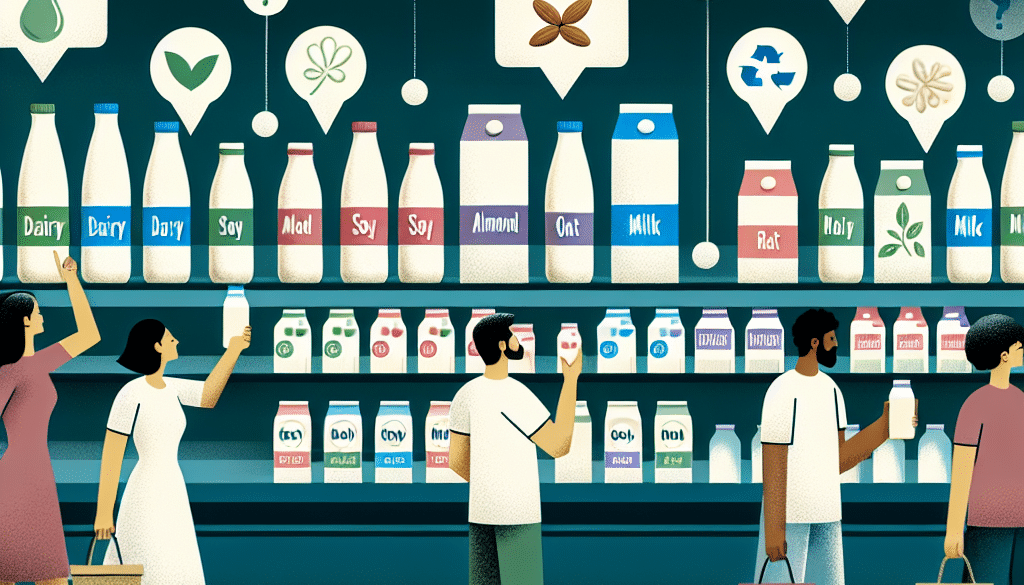Study Explores Why Consumers Choose Dairy Milk or Plant-based Alternatives
-
Table of Contents
- Dairy Milk vs. Plant-Based Alternatives: Understanding Consumer Choices
- The Rise of Plant-Based Milk Alternatives
- Health Concerns and Nutritional Considerations
- Environmental Impact and Sustainability
- Lactose Intolerance and Dietary Restrictions
- Ethical Considerations and Animal Welfare
- Case Studies and Statistics
- Conclusion: Key Takeaways
- ETChem: Your Source for High-Quality Protein Products
Dairy Milk vs. Plant-Based Alternatives: Understanding Consumer Choices
In recent years, the dairy industry has witnessed a significant shift as consumers increasingly opt for plant-based milk alternatives. This trend has sparked a plethora of studies aiming to understand the motivations behind consumer choices in the milk aisle. This article delves into the factors influencing the decision-making process of consumers when it comes to selecting dairy milk or its plant-based counterparts.
The Rise of Plant-Based Milk Alternatives
The market for plant-based milk alternatives has seen exponential growth, with options such as almond, soy, oat, and coconut milk becoming household staples. This surge is not merely a trend but a reflection of changing consumer preferences and values. A variety of factors contribute to this shift, including health concerns, environmental impact, lactose intolerance, and ethical considerations regarding animal welfare.
Health Concerns and Nutritional Considerations
One of the primary reasons consumers choose plant-based milk is due to health concerns. Many people perceive plant-based milks to be lower in calories, saturated fats, and cholesterol, making them a heart-healthy option. Additionally, plant-based milks often come fortified with vitamins and minerals, such as calcium and vitamin D, which can appeal to those looking to supplement their diets.
- Almond milk is known for being low in calories and rich in vitamin E.
- Soy milk provides a complete protein profile similar to that of cow’s milk.
- Oat milk is favored for its fiber content and beta-glucans, which may benefit heart health.
However, it’s important to note that not all plant-based milks are created equal, and some may contain added sugars or lack certain nutrients found in dairy milk. Consumers are encouraged to read labels carefully to make informed choices.
Environmental Impact and Sustainability
The environmental footprint of dairy milk production is another significant factor influencing consumer choices. Dairy farming requires substantial land, water, and resources, and it contributes to greenhouse gas emissions. In contrast, plant-based milks generally have a lower environmental impact, with almond, soy, and oat milk production using less water and land and generating fewer emissions.
- Almond milk production is water-intensive, but it still uses less water than dairy farming.
- Soy and oat milk are praised for their lower water usage and reduced carbon footprint.
Consumers who prioritize sustainability may opt for plant-based alternatives as a way to reduce their personal impact on the planet.
Lactose Intolerance and Dietary Restrictions
Lactose intolerance affects a significant portion of the global population, leading many to seek out non-dairy alternatives. Plant-based milks are naturally lactose-free, making them a suitable choice for those with lactose intolerance or milk allergies. Additionally, plant-based milks cater to various dietary restrictions, including vegan and kosher diets.
Ethical Considerations and Animal Welfare
Animal welfare is a concern for many consumers who choose plant-based milk alternatives. The dairy industry has faced criticism for practices that some consider inhumane. Plant-based milks offer an alternative that does not involve animal husbandry, aligning with the ethical values of consumers who advocate for animal rights.
Case Studies and Statistics
Several studies have highlighted the motivations behind the choice of milk alternatives. For instance, a survey conducted by Mintel found that 49% of consumers choose plant-based milks for health reasons, while 36% cited environmental concerns. Another study by the Plant Based Foods Association reported that sales of plant-based milks grew by 6% in one year, while dairy milk sales declined.
Conclusion: Key Takeaways
The choice between dairy milk and plant-based alternatives is influenced by a complex interplay of health, environmental, ethical, and dietary factors. Consumers are increasingly educated and aware of the impacts of their food choices, leading to a growing demand for plant-based options. As the market evolves, it is likely that we will continue to see innovation and expansion in the variety of plant-based milks available.
ETChem: Your Source for High-Quality Protein Products
If you’re looking for premium protein products to complement your dietary choices, ETChem offers a range of collagen products suitable for various applications. Whether you’re a manufacturer or a consumer, ETChem’s collagens, including marine, fish, bovine, and chicken collagen, provide high-quality protein options to meet your needs.
ETChem’s commitment to quality and customer satisfaction makes them a leading choice for those seeking reliable protein solutions. Their products are ideal for the nutraceutical, pharmaceutical, cosmeceutical, and food and beverage industries. With a focus on neutral taste and instant solubility, ETChem ensures that their collagens can seamlessly integrate into your products and lifestyle.
Contact ETChem today to explore their range of protein products and find the perfect solution for your protein needs.
About ETChem:
ETChem, a reputable Chinese Collagen factory manufacturer and supplier, is renowned for producing, stocking, exporting, and delivering the highest quality collagens. They include marine collagen, fish collagen, bovine collagen, chicken collagen, type I collagen, type II collagen and type III collagen etc. Their offerings, characterized by a neutral taste, instant solubility attributes, cater to a diverse range of industries. They serve nutraceutical, pharmaceutical, cosmeceutical, veterinary, as well as food and beverage finished product distributors, traders, and manufacturers across Europe, USA, Canada, Australia, Thailand, Japan, Korea, Brazil, and Chile, among others.
ETChem specialization includes exporting and delivering tailor-made collagen powder and finished collagen nutritional supplements. Their extensive product range covers sectors like Food and Beverage, Sports Nutrition, Weight Management, Dietary Supplements, Health and Wellness Products, ensuring comprehensive solutions to meet all your protein needs.
As a trusted company by leading global food and beverage brands and Fortune 500 companies, ETChem reinforces China’s reputation in the global arena. For more information or to sample their products, please contact them and email karen(at)et-chem.com today.





